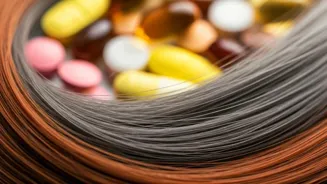Vitamin's Role
The appearance of grey hair is often associated with aging, but it can also be linked to vitamin deficiencies. Certain vitamins are essential for maintaining
the natural color of your hair. For example, vitamin B5 (pantothenic acid) is a key player in this process. Similarly, vitamins like B12 and biotin (B7) also have a significant impact on hair pigmentation. Ensuring an adequate intake of these vitamins can help prevent premature greying and promote healthier hair.
Vitamin B5's Impact
Vitamin B5, also known as pantothenic acid, is important for various bodily functions, and hair pigmentation is among them. It is a water-soluble vitamin that cannot be stored in the body, so it must be obtained regularly through diet. This vitamin helps in the production of melanin, which gives hair its color. Deficiencies in vitamin B5 may contribute to the loss of pigment and the early onset of grey hair. Including foods rich in vitamin B5, such as eggs, avocados, and certain nuts, is essential for maintaining vibrant hair color and overall health.
B12 and Hair Color
Vitamin B12 is another crucial nutrient in maintaining healthy hair. This vitamin plays a role in red blood cell formation and neurological function. Moreover, it is essential for DNA synthesis, which impacts the health and growth of hair follicles. A deficiency in vitamin B12 can affect the production of melanin, leading to a loss of hair pigment. Incorporating B12-rich foods like meat, fish, and dairy products into your diet, or taking supplements if necessary, can help support your hair's natural color and overall health. Consulting with a healthcare provider can help determine the right approach for you.
Biotin and Hair Health
Biotin, or vitamin B7, is vital for various metabolic processes, including those affecting hair health. Often touted for its benefits in strengthening hair and nails, biotin also contributes to maintaining hair color. While the exact mechanism is still being studied, biotin is essential for the production of keratin, a protein that forms the building blocks of hair. Adequate biotin levels support healthy hair follicle function and may prevent premature greying. Foods like eggs, nuts, and seeds are rich in biotin, so consuming them is crucial for maintaining a healthy hair color. Supplementing with biotin can be beneficial if dietary intake is insufficient.
Supporting Hair Color
Besides focusing on individual vitamins, a balanced approach is necessary to support natural hair color. Ensure a diet rich in essential nutrients, including B vitamins, and minerals like copper, zinc, and iron. Copper is involved in melanin production, and zinc helps in tissue repair and growth. Iron carries oxygen to hair follicles, which promotes healthy hair growth. Incorporating foods with these nutrients, along with vitamin-rich foods, offers your hair the best support. Furthermore, staying hydrated and managing stress levels are also important for overall hair health and preventing greying.
Vitamin D Deficiency
Vitamin D plays many roles in overall health, and some research suggests it may have an impact on hair health and the onset of greying. Vitamin D aids in calcium absorption and bone health. Research indicates that low levels of vitamin D could be associated with increased chances of hair pigment loss. Vitamin D deficiency can be addressed through exposure to sunlight and consuming foods rich in vitamin D, such as fortified dairy products and fatty fish. Consulting with a healthcare provider to check your vitamin D levels and discussing potential supplementation is also advised.













